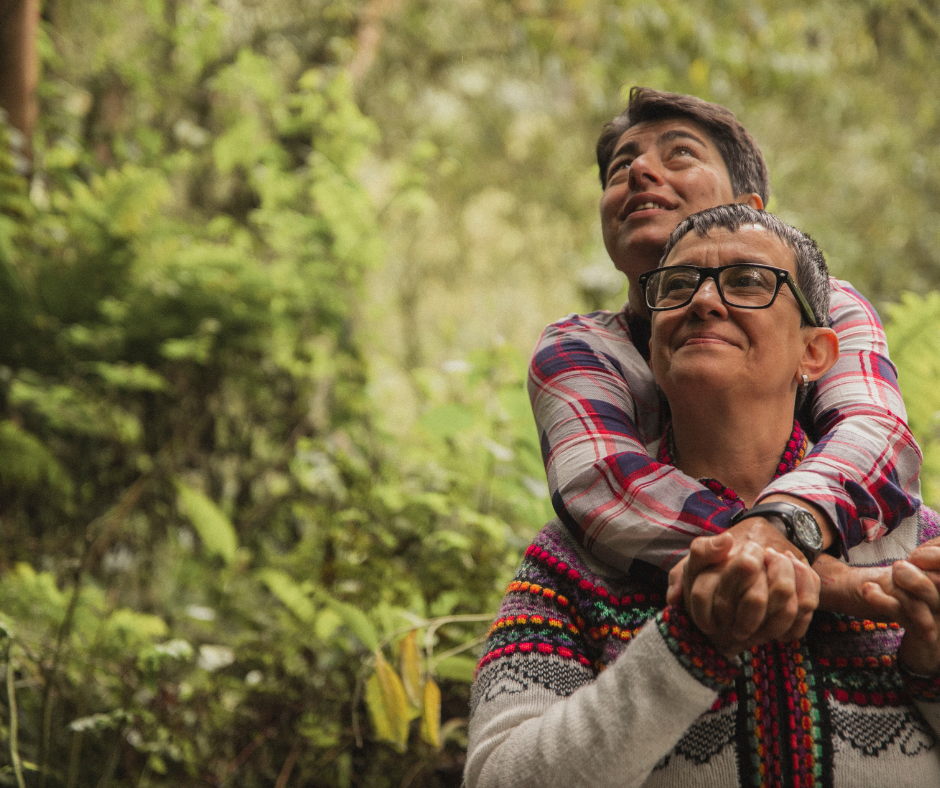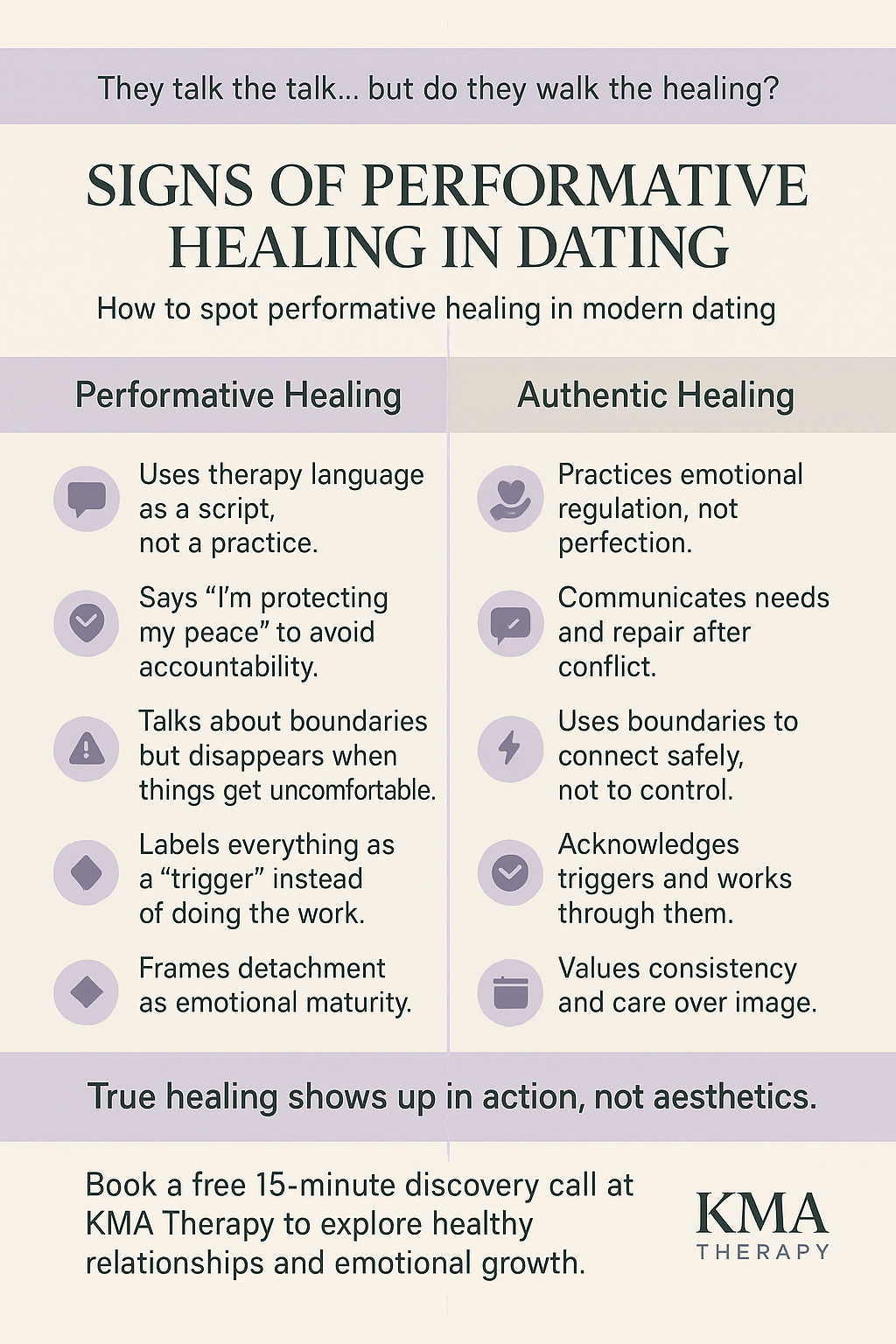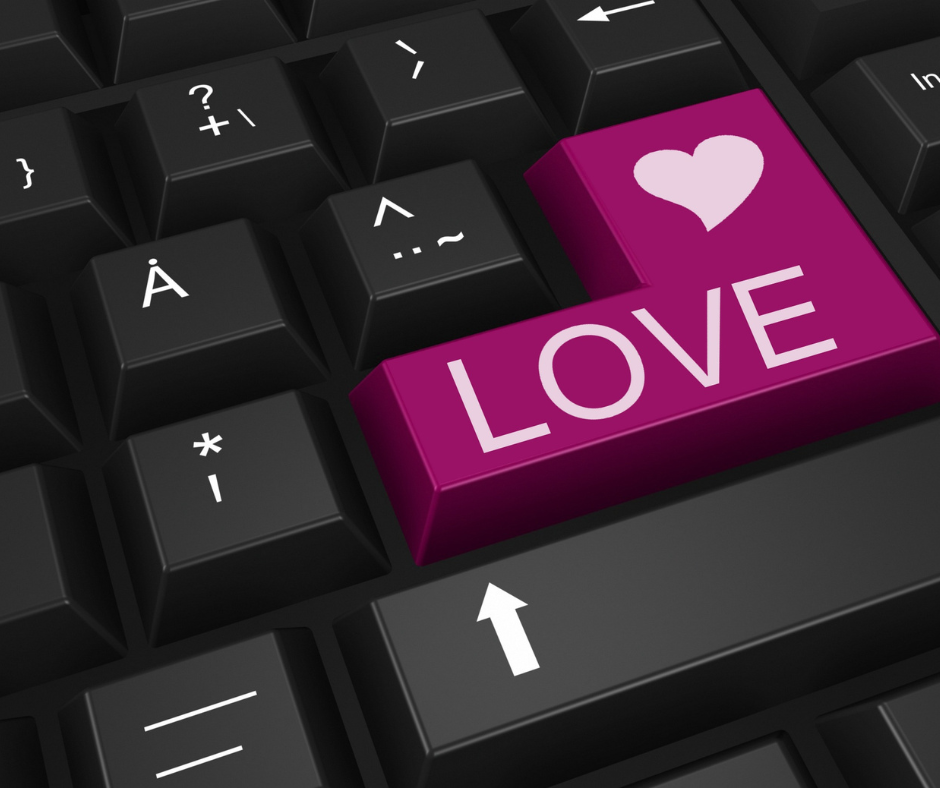When “Green Flags” Become Red: The Evolving Standards of Modern Dating
Modern dating is a maze of contradictions.
We talk more than ever about boundaries, attachment styles, and “green flags.” We analyze texts, therapy-speak our way through red flags, and try to date consciously — yet somehow, it still feels harder to connect.
You might go on a date with someone who seems perfect: emotionally available, communicative, “healed.” But weeks later, that same calm confidence starts to feel… cold. Detached. Even dismissive.
What happened?
Did the green flag turn red — or did we just learn what it means to outgrow our old standards?
Let’s unpack why even the healthiest-seeming relationships sometimes end up hurting — and how therapy can help you date with both openness and discernment in today’s world.

💬 The “Green Flag” Era
If the 2010s were all about avoiding red flags, the 2020s are about spotting green ones.
Social media and therapy culture have shifted how we talk about dating. A partner who goes to therapy, communicates boundaries, or knows their attachment style is instantly praised. And for good reason — emotional literacy matters.
But there’s a catch: many people have learned the language of awareness without the embodiment of it.
They can name their triggers but not regulate them.
They talk about accountability but rarely show it.
They sound secure — but act unavailable.
What started as a guide for emotional safety has become, for some, a checklist of performance.
Green flags, when used rigidly, can disguise deeper relational patterns we don’t yet recognize.
🌱 When Green Flags Turn Red
Sometimes, what initially feels emotionally mature can reveal something else with time. Here’s how that can look:
- “They’re great at communicating their boundaries”
...but they use boundaries to keep distance instead of build trust. - “They’re super independent”
...but struggle with interdependence — the healthy middle between autonomy and closeness. - “They’re calm and logical”
...but seem emotionally unavailable or dismissive when you express vulnerability. - “They don’t play games”
...but also avoid any emotional risk.
None of this means these people are “bad” — it means our understanding of what healthy love looks like is evolving. What once felt refreshing (“they’re not chaotic!”) might, over time, feel disconnected (“they don’t let me in”).
Growth means realizing that stability alone isn’t enough — emotional engagement matters too.
🧠 The Psychology of Idealization
Early attraction thrives on projection.
We often fill in the blanks with what we want someone to be, not who they actually are. Maybe they seem calm, grounded, or certain — and that feels safe after years of chaos or inconsistency.
But what we interpret as emotional steadiness might sometimes be emotional suppression.
What we read as maturity might be avoidance.
And what we call “secure” might just be… detached.
The brain craves patterns it recognizes. If you’ve experienced anxious or avoidant dynamics before, you might unconsciously be drawn to what feels familiar — even if it’s just a new version of the same old wound.
Therapy helps interrupt that cycle by teaching you how to distinguish comfort from compatibility.

❤️ The “Healed” Dating Trend (And Why It’s Complicated)
There’s a new kind of pressure in dating: to be perfectly self-aware, emotionally evolved, and “healed.”
It sounds empowering — but it can become isolating. People feel they must present as fully resolved, leaving no room for humanity or growth. Vulnerability gets replaced with polished self-awareness.
You might hear things like:
“I’m protecting my peace.”
“I’m not available for that kind of energy.”
“I’ve done my healing.”
While boundaries and emotional clarity are crucial, overusing these phrases can create walls instead of bridges. Sometimes “protecting your peace” becomes “avoiding intimacy.”
Healing isn’t about never getting triggered — it’s about learning to repair, connect, and stay open even when you are.
🪞 When Self-Awareness Becomes a Shield
In therapy, we often see how insight can turn into avoidance.
For example, someone might say:
“I know I have an anxious attachment style, so I’m just going to stay single.”
Or:
“I don’t want to project my trauma, so I’ll keep my distance until I’m fully healed.”
But healing happens in connection, not away from it.
Relationships are where self-awareness gets tested, stretched, and integrated.
If self-awareness becomes a shield, it keeps us safe — but also lonely.

⚡️ Pop Culture and the Performance of Emotional Maturity
If you’ve ever scrolled TikTok and seen a creator explaining “green flags in men” or “how to attract secure partners,” you’ve witnessed the new language of dating: therapy-adjacent, bite-sized, and hyper-analytical.
While these conversations are helpful in breaking stigma, they also oversimplify what’s deeply human. A person can tick every green flag box and still not be ready for love.
Pop culture has made emotional intelligence aspirational — but sometimes performative.
When dating apps and social platforms reward presentation over presence, it’s easy to conflate awareness with emotional depth.
Real emotional maturity can’t be faked — it’s visible in how people handle conflict, not how they talk about it.
🌪 Emotional Availability vs. Emotional Intensity
We often confuse emotional intensity for intimacy. Someone who texts constantly, expresses big feelings, or moves quickly can feel like a deep connection — until it isn’t.
True emotional availability looks quieter:
It’s consistency over chemistry.
It’s curiosity instead of certainty.
It’s repair over reaction.
It’s saying, “I’m still here,” even when things feel uncomfortable.
This kind of connection often feels boring at first — especially if chaos has been your baseline. But learning to recognize peace as passion is part of emotional growth.
💬 The Role of Therapy in Modern Dating
Therapy gives us language for our emotions — but more importantly, it helps us live them differently.
It’s not just about knowing your attachment style; it’s about noticing your body’s reactions, your tone, and the stories you tell yourself about love.
In session, you might explore:
- why you’re drawn to emotionally unavailable partners
- what safety and excitement mean to you
- how to recognize when a “green flag” is rooted in avoidance
- what healthy interdependence looks like
Therapy doesn’t promise a perfect partner — it helps you build a healthier relationship with yourself, so you can recognize real compatibility when it appears.

💔 Dating After Disappointment
If you’ve been ghosted, breadcrumbed, or emotionally mismatched, you might start to assume there’s no point in trying. But part of dating in 2025 means learning to hold two truths at once:
Yes, dating can be messy.
And yes, you still deserve connection.
It’s okay to feel tired of effort that goes nowhere. It’s also okay to want love, even when it feels risky.
Healing doesn’t mean avoiding relationships — it means showing up differently inside them.
🧩 How to Date Consciously (Without Losing Hope)
You don’t need a perfect partner — you need an emotionally present one.
Here are a few mindset shifts that help:
1. Trade “perfection” for awareness.
Look for partners who reflect, not just perform. Emotional maturity isn’t flawless behavior; it’s accountability.
2. Notice how you feel, not just what they say.
Do you feel calm or confused after spending time with them? The body often senses truth before the mind does.
3. Don’t rush “security.”
Real safety develops over time. If someone insists they’re healed and ready on date one — that’s information.
4. Let curiosity lead.
Ask: “How do you handle conflict?” or “What helps you feel supported?” Green flags grow in conversation, not in checklists.
5. Remember — it’s okay to want more.
Wanting depth doesn’t make you needy; it makes you human.
🌷 The New Standard: Secure, Not Perfect
The healthiest relationships aren’t free of tension — they’re built on repair, communication, and grace.
The next chapter of dating culture isn’t about avoiding red flags or collecting green ones. It’s about learning to spot the shades in between — and choosing partners who meet you there with care and curiosity.
Dating in 2025 asks us to evolve past buzzwords and return to something much simpler:
Authenticity. Presence. Willingness to grow.
💜 The Bottom Line
If you’ve found yourself exhausted by dating, therapy can help you understand why certain patterns repeat — and how to create new ones.
You don’t need to be perfectly healed to find love. You just need to be willing to meet yourself honestly, and to choose people who do the same.
✨ Ready to Reframe What “Healthy Love” Means?
At KMA Therapy, our relationship therapists help you explore attachment patterns, rebuild trust, and learn new tools for communication, confidence, and connection.






